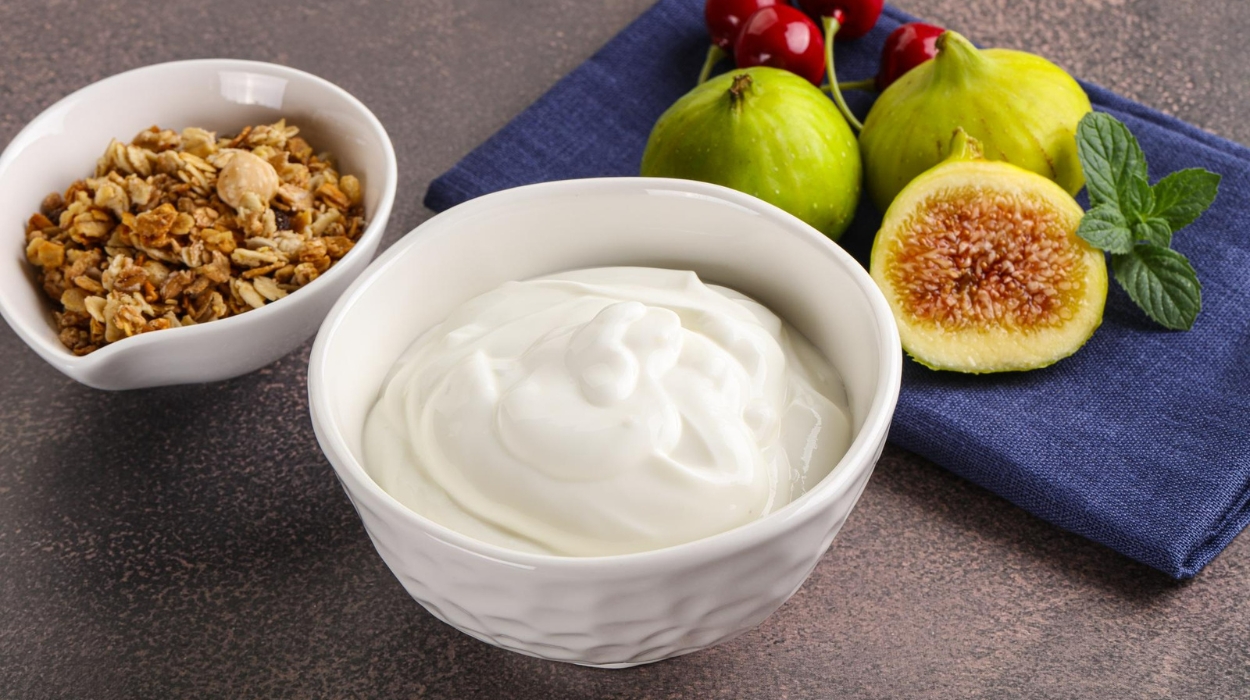We’ve all been there:
Late for work, you grab a cup of coffee and a bagel for breakfast. Or you have a protein bar as the only nourishment. And that, you think, was a healthy breakfast!
Does this qualify as a good breakfast, especially if you are on a weight loss journey?
People watching their weight might agree because you meet one condition necessary for weight loss – eating less. However, medical experts may disagree.
Here, we’ll highlight both sides to answer the question: “Is breakfast good for weight loss?”
Is Eating Breakfast Good For Weight Loss?
Yes, eating breakfast can aid weight loss. A balanced morning meal, rich in nutrients and healthy fats, helps control overall calorie intake. This meal also kick starts metabolism, providing sustained energy throughout the day. Nutrient options like whole grains and protein support weight loss by promoting satiety and regulating blood sugar levels.
So, for a successful weight management journey, make breakfast a mindful and nutritious start to your day.
Is Breakfast Good For Weight Loss?

Some studies are built on the notion that breakfast is associated with decreasing body weight. Others suggest breakfast causes additional calorie intake,[1] contradicting weight loss.
But what about those who practice time-restricted eating and skip breakfast altogether?
These results vary:
- In a systematic review and meta-analysis conducted between January 1990 and January 2018, breakfast skippers had a lower body weight.[1] They also had lower daily food intake compared to those who had breakfast.
- A 2021 review provides minimal evidence that skipping breakfast leads to weight gain.[2] According to three meta-analyses, skipping breakfast for at least three days may increase obesity risk by 11%. This percentage is compared to skipping breakfast for two or fewer days.
- Intermittent fasting programs, which may involve skipping breakfast, could be a primary cure for obesity.[3] Generally, these help reduce body weight[4] and, for healthy, obese, and dyslipidemic men and women, reduce cholesterol levels.[5] In men, intermittent fasting may decrease fat mass, and maintain muscle mass.[6] However, little is known about these diets’ long-term effects. Also, since intermittent fasting is highly customizable, it doesn’t prove or negate if having breakfast is good for weight loss.
- Skipping breakfast could worsen[7] lipid profiles, insulin resistance, blood pressure, and metabolic syndrome in children and adolescents.
- These examples support skipping breakfast being bad for weight loss, but they are still not definitive. More scientific evidence is needed. So, using breakfast for weight loss means watching what you eat.
This relies on:
- The nutritional value of your breakfast meal.
- The total calorie number.
The Nutritional Value Of The Breakfast
When breakfast foods support weight loss, you may lose weight. However, morning meals with foods low in nutrition, like highly processed foods, counteract your weight loss goals.
A regular breakfast with fresh fruit, natural cereal flakes, nuts, seeds, and yogurt results in less abdominal obesity.[8] This benefit relies on having a healthy all-day meal plan.
Total Calorie Count
Watching how many calories you ingest for breakfast is vital. If you consume extra calories that exceed the body’s fat-burning capability, that meal doesn’t serve weight loss goals.
A healthy breakfast should have nourishing foods with a low total calorie count. Consuming fewer calories activates a calorie deficit. A caloric deficit of 500 to 750 calories[9] daily may create a gap that triggers weight loss.
Here are some ways to help you keep breakfast low-calorie:
- Knowing why protein is vital for weight loss and prioritize proteins, fiber, and healthy fats.
- Control your portions.
- Limit sugary toppings.
What Is A Good Breakfast For Weight Loss?
A nutritionally rich breakfast in moderate portions aids weight loss. But what makes a good breakfast for weight loss?
Include these nutrients in your morning meal:
- High protein foods for satiety.[10]
- Fiber for appetite control through slowed gastric emptying.[11]
- Healthy fats to reduce the risk of cardiovascular disease.[12]
- Complex carbohydrates for sustained energy release and modulating gut microbiota.[13]
- Vitamins and minerals for normal cognition and enhanced well-being.[14]
Some good breakfast meals for weight loss:
Savory Quinoa Bowl 350 Calories
- Satiety: 1/4 cup cooked quinoa 8 grams of protein + 1/4 cup chopped avocado 3 grams of fat – 59 calories.
- Appetite Control: 1/2 cup chopped zucchini 2 grams of fiber + 1/4 cup cherry tomatoes 1 gram of fiber – 6 calories.
- Sustained Energy: 1/4 cup whole-wheat croutons 12 grams of carbs – 48 calories.
- Healthy Fats: Drizzle a tablespoon of olive oil + a handful of sunflower seeds 5 grams of fat -165 calories.
- Vitamins and Minerals: B vitamins, vitamins C, K, folate, copper, magnesium, selenium, and potassium.
Greek Yogurt Parfait 300 Calories

- Satiety: 1 cup plain Greek yogurt 20 grams of protein + 1 scoop protein powder 20 grams of protein – 160 calories.
- Appetite Control: 1/2 cup mixed berries 3 grams of fiber + 1/4 cup chopped almonds 2 grams fiber -10 calories.
- Sustained Energy: 1/4 cup granola 15 grams of carbs – 60 calories.
- Healthy Fats: Sprinkle chia seeds with 4 grams of fat – 36 calories.
- Vitamins and Minerals: Vitamin A, B12, C, D, E, folic acid, riboflavin, calcium, potassium, magnesium, phosphorus, iron, and zinc.
Bonus: Protein Shake Recipe 250 Calories
Blend:
- 1 cup unsweetened almond milk – 30 calories per cup.
- 1/2 scoop vanilla protein powder – 40 calories.
- 1/4 cup chopped banana – 30 calories.
- 1/2 cup spinach – 5 calories.
- One tablespoon of natural peanut butter – 72 calories.
- 1/2 teaspoon cinnamon.
- Pinch of nutmeg.
Vitamins and minerals: Vitamin A, B6, C, E, folic Acid, manganese, niacin, calcium, potassium, magnesium, phosphorus, iron, and zinc.
These options offer you a weight-conscious breakfast. You can tweak the meal plans for both non-vegetarian and vegetarian weight loss meal plans. You can also modify the protein shakes for your workouts.
Consult a registered dietitian for personalized morning meal plans.
Foods To Completely Omit From A Weight Loss Diet And Why
Omit:
Processed Foods
Processed foods are laden with unhealthy additives. They contain refined sugars, unhealthy fats, and artificial additives. These choices disrupt metabolic processes[15] and contribute to calorie-dense, nutrient-poor diets.
Understanding the impact of processed foods on weight change helps you prevent obesity.[16] Processed foods include sugary breakfast bars, sweetened yogurts, and processed meats.
So, if anyone asks, “Is cereal a good breakfast for weight loss?”
Yes, if they are natural cereal flakes.
Anything ultra-processed is a no-no.
Sugary Beverages
Sugary beverages like soda, flavored coffee, and sweetened milk counteract weight loss.
Reducing their consumption helps you lose weight by reducing overall calorie consumption. Consuming less sugary drinks also reduces obesity statistics[17] in children.
Trans Fats And Additives
Trans fats and artificial additives can contribute to weight gain.
Trans fats may heighten the risk of obesity and coronary heart disease.[18]
Additives like non-nutritive artificial sweeteners may also increase obesity.[19] They also disrupt gut health, alter appetite, and reduce satiety.
According to recent research, some additives[19] to watch out for are
Artificial sweeteners:
- Aspartame.
- Sucralose.
- Acesulfame potassium.
- Saccharin.
Other additives:
- Monosodium glutamate, i.e., MSG.
- High-fructose corn syrup, i.e., HFCS.
- Carrageenan.
- Artificial flavors and colors.
- Emulsifiers and stabilizers.
How To Use Diet Pills Alongside Breakfast For Weight Loss
Some people seeking fast weight loss may use diet pills. They can help your weight loss.
So, how do you incorporate them into a healthy weight-loss breakfast?
It’s easy. You simply:
- Start with consulting a registered dietitian.
- Assess the safety and effectiveness of the diet pills’ ingredients.
- Ensure the diet pills are free of artificial additives.
- Once approved, stick to the recommended dosages and instructions.
Remember that fat burners and diet supplements are supplementary. All healthy diets and meals, including breakfast, are the basis of a weight loss journey. Exercise, sleep, stress management, and hydration follow suit.
Why Is Breakfast Good For You?
Breakfast, the most important meal of the day, deserves all the praise it gets. Reasons to start your day with a good breakfast:
- Energy Booster: Breakfast replenishes your glucose stores and gives your metabolism a kickstart after an overnight fast. Complex carbohydrates like sweet potatoes offer sustained energy release throughout the day.
- Brainpower: Breakfast may improve attention, memory, and cognitive function.[20] Especially Greek yogurt, berries, nuts, scrambled eggs, spinach, overnight oats, and avocados.
- Weight Management: A healthy breakfast can help you maintain a healthy weight. It helps appetite control and satiety, preventing overeating.
- Nutrient Nugget: A good weight loss breakfast supplies the body with healthy proteins, carbs, vitamins, minerals, and fiber.
- Blood Sugar Control: A balanced breakfast may aid blood sugar level regulation. However, you must ensure the foods you include are low-glycemic foods.[21] These foods release sugar slowly, keeping you fuller for longer and managing blood sugar better.
Examples of low-glycemic breakfast treats are hard-boiled eggs and avocado whole-grain toast.
- Heart protective: Low-fat milk[22] and whole grains[23] benefit the heart.
Conclusion
Breakfast is a vital meal of the day, aiding weight loss. Selecting healthy breakfast foods with a low-calorie count is the goal.
Fresh, healthy, naturally low-sugar, and low-calorie items make up an excellent weight-loss breakfast. Omit processed foods, sugary drinks, trans fats, and artificial additives.
Skipping breakfast might seem like a good idea, but science is inconclusive. Although you may miss breakfast during an intermittent fasting program, it’s still not wise to do it unsupervised. A healthier way is to ensure a registered dietitian guides you on healthy breakfast eating practices.
Frequently Asked Questions
Skipping breakfast may lower overall calorie intake, but it is not sustainable for weight loss. A healthy and balanced breakfast offers better weight loss benefits.
A heavy breakfast with healthy fats, proteins, fiber, and other essential nutrients can help you lose weight.
300 calories for breakfast is moderate, depending on your daily needs.
Skipping lunch might lead to short-term weight loss. Yet, it can mess with metabolism, energy levels, and long-term progress. Consider mindful eating and balanced meals instead.
Yes, you can eat a banana breakfast for weight loss.
Yes, oatmeal is a good breakfast for weight loss.
Caramel syrup is not recommended as it increases calorie intake, which may lead to weight gain.
 Evidence Based
Evidence Based
